Itching is not a disease, but only a symptom. According to doctors, the body cannot itch without a reason. Most often, the reason that the body itches is some kind of disease, even if peeling, dryness and itching go away for no apparent reason.
It is necessary to understand the reasons before starting treatment. Itching is dangerous because the patient can scratch the skin, which will lead to inflammation, infection and dehydration.
Skin diseases
The most common cause of itching is skin diseases. An inflammatory process appears, which is accompanied by itching.
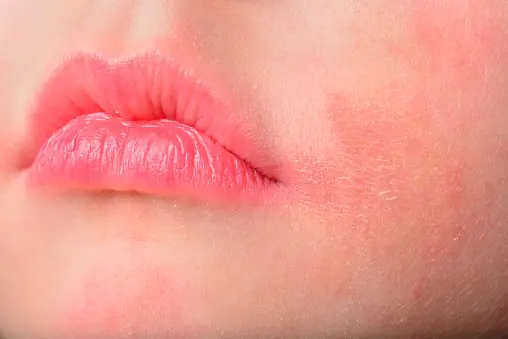
Most often occurs due to hereditary predisposition. Stress, anxiety and poor living conditions are also prerequisites for the development of dermatitis.
Eczema
An inflammatory skin disease that causes blistering and burning. Also characterized by redness and itching. When scratching the blisters, erosions appear that turn into crusts.
Most often appears on the hands and face. It occurs in a chronic form and is accompanied by respiratory tract infections, as well as metabolic disorders.
Dermatophytosis
The answer to the question of why the body itches for no apparent reason may be the disease dermatophytosis. It is caused by fungi that live in the soil, the body of animals and humans.
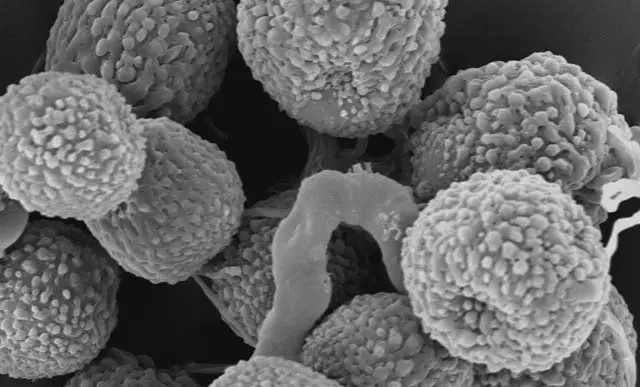
Fungi penetrate into the upper layers of the skin, decompose proteins and feed on decay products. Dermatophytosis can occur on the scalp or body, on smooth skin, and on the nails.
Lichen
A skin disease that is caused by fungi or viruses. Most often develops after direct contact with an infected person or animal. There are several varieties: pink, cutting, weeping, girdling.
Most often appears on the scalp. The affected area becomes bright red, flaky and itchy. The main factor in contracting lichen is a weakened immune system.
Pediculosis or human lice infestation
The main factor of infection is unsanitary living conditions. Lice can be contracted in villages and villages, from people without a fixed place of residence.
Pediculosis is an ancient disease that most often occurs as an epidemic. You can become infected with it in a military barracks, children's camp, or school.
Blood-sucking parasites cause a lot of trouble. Their bites cause severe itching, but the main danger is that they carry typhus. Lice live on the scalp or pubic area.
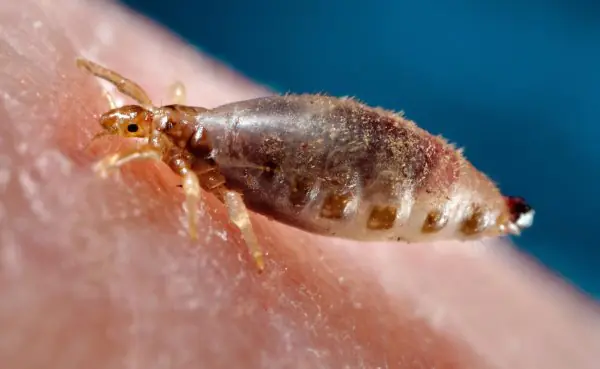
Important point! To avoid becoming infected with lice, do not use other people's combs and do not give yours to anyone. Also be careful about the cleanliness of your pillows, and try not to sleep on a shared bed.
Note! You can only get lice from other people. Other types of lice live on the body of animals, which are not dangerous to humans.
Psoriasis
A type of scaly lichen. Inflammation is caused by the body's immune cells. The disease is characterized by red, dry spots that are covered with a white coating.
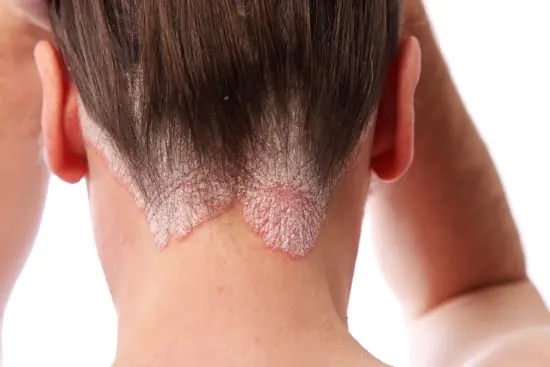
Most often they appear on the bends of the elbows, on the head, and lower back. They can also affect other parts of the body, as well as the mucous membrane of the genital organs. Factors that cause psoriasis: heredity, infections, HIV, certain medications.
Scabies
A disease caused by parasites. Scabies mites feed on the upper layers of human skin. The first sign of the disease is blisters in the interdigital folds. They itch a lot, the itching gets worse in the evenings.
Scabies can be contracted from contact with a sick person, through bed, clothing, and household items. In this case, the incubation period of the disease can last up to 4 weeks.
Hives
An allergic disease characterized by a red rash. The patient may scratch it vigorously, which only aggravates the disease. Often accompanied by Quincke's edema.
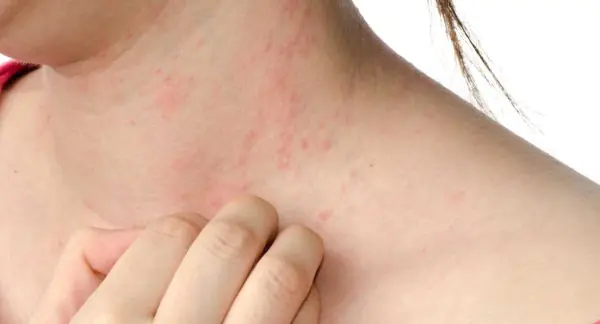
Causes may include food allergens, digestive disorders, insect bites, and hypothermia. With disorders of the kidneys, liver or intestines, urticaria takes a chronic form.
Xerosis
Abnormal dry skin. This is a consequence of severe itching or infectious diseases. The skin becomes rough, peels, itches, and turns red.
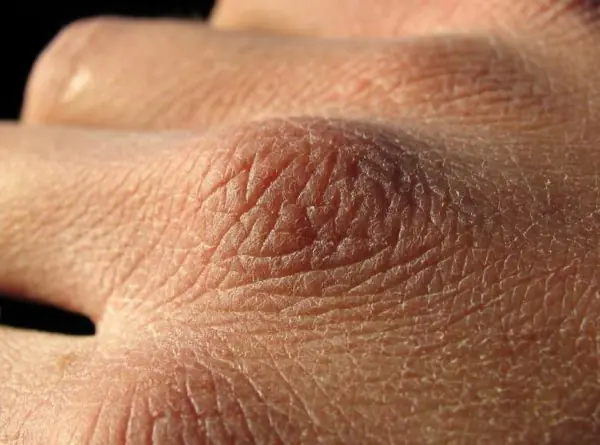
Xerosis can be a symptom of other disorders: psoriasis, dermatitis, eczema, seborrhea.
In addition, xerosis is caused by cirrhosis of the liver, hepatitis, and renal failure.
It may be caused by a cancerous tumor. When xerosis appears, it is especially important to examine the internal organs.
Systemic diseases
Systemic diseases are diseases of internal organs that may be accompanied by itchy skin. To accurately diagnose a particular disease, listen to other symptoms and consult a doctor.
| Why the body itches for no apparent reason is a disease | Nature of itching | Other symptoms |
| Allergy | Most often accompanied by the skin diseases listed above. The patient suffers from severe itching throughout the day. | Skin rash, digestive disorders. |
| Cancer | Body itching may occur after swimming. Most often, itching is localized in the lower extremities. Itching is the first symptom of cancer, after which others appear. | Skin rashes, spots, swelling of the limbs and face. |
| Cholestasis | Itching and skin rashes indicate problems with the gallbladder. The skin may turn yellow. The skin reaction occurs due to the accumulation of bile in the bile ducts. | Jaundice, nausea, weakness, pain in the right hypochondrium. |
| Diabetes | Due to excessive accumulation of sugar in the blood, peeling and itching of the skin, dryness and deterioration of its condition appear. Scratching can lead to infection with infectious and viral diseases. | Thirst, frequent urination, blurred vision, weight loss. |
| Anemia | The itching is not permanent; most often it is localized to a specific area of the body. Skin burning may occur. | Weakness, headache, appetite disorder, exercise intolerance. |
| Multiple sclerosis | In cases of nervous system disorders, the skin may experience itching and burning. Other unpleasant sensations also occur: tingling, numbness, and decreased sensitivity. | Photosensitivity, impaired color perception, hand tremors, changes in gait, instability, frequent urination or retention, sexual dysfunction. |
| Thyroid diseases | There is dryness, flaking and itching of the skin. The skin of the hands and face is most often affected. You can soften the symptoms with moisturizing creams and oils. | Rapid heartbeat, anxiety, irritability, weight loss or gain, sweating, depression. |
| Liver diseases | Any of the liver diseases affects the external condition of the skin. When there are parasites or toxins in the liver, itching is observed, localized mainly on the hands and face. | Jaundice, pain in the right hypochondrium, burning skin. |
| Kidney diseases | Most often, itching occurs in the genital area, this indicates an inflammatory process. With kidney failure, skin diseases may develop, which are accompanied by itching and rashes on the skin. | Swelling, pain in the kidney area, blood in the urine, urination problems. |
Why the body itches for no apparent reason - the answer may lie in diseases of the internal organs.
Most often, this is not the only symptom and the disease can be diagnosed by other symptoms. But it is best to immediately consult a doctor who will conduct an examination and make the correct diagnosis.
Other common causes of itching for no apparent reason
Itchy skin is not always caused by serious illnesses. This may be a consequence of stress, age-related changes in the body, or a reaction to allergens and medications.
Infection with immunodeficiency virus
HIV does not manifest itself in the body for a long time, and the infected person may not be aware of the disease. But he has signs that indicate immunodeficiency. Skin signs are:
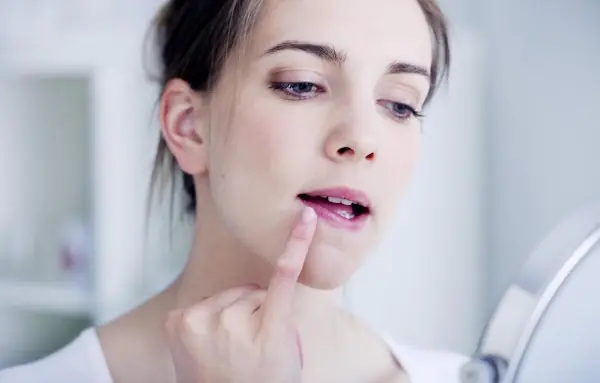
Fungal and viral diseases are accompanied by itching. Most often, herpes affects the mucous membranes, which are very itchy at the initial stage of the disease. Eczema can occur on the hands and face.
Mental disorders: psychogenic itching
Our body is sensitive to stress and anxiety. It often responds with redness in certain areas, itching, and chest pain. If you are sure that you are healthy and there can be no other reason for the itching, try to be less nervous and the itching will go away.
Allergic skin itching in adults and children
Food allergens cause irritation of the intestinal walls, which immediately affects the skin. Rashes and itching appear. Allergies to cosmetics, shampoos, soaps, and cleaning products may also occur. It is recommended to find the cause and not come into contact with this reagent.
Seasonal itching
For no apparent reason, the body may itch in the fall and spring in patients with vegetative-vascular dystonia. Why this happens cannot be said with certainty. Most likely, this is due to a lack of vitamins in the diet and weather changes.
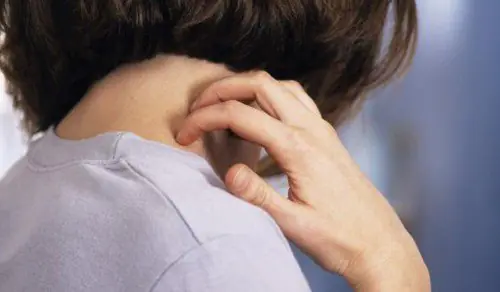
Dehydration
If your body itches, but there is no visible reason for it, it may be a consequence of dehydration. It is difficult to say why this condition occurs. The reason may be insufficient fluid intake or a large loss of fluid if you were in extreme conditions.
Senile or senile itching
In old age, the body undergoes many changes: metabolism changes, the skin becomes thin and dry, the functioning of the sebaceous glands is disrupted, and cell renewal slows down.

This leads to unpleasant consequences: irritation, peeling, and itching. The skin of the face most often suffers, as it is thinner and more sensitive.
Note! Over many years of life, the body accumulates stress, allergens, and diseases, which can make the body itch. Even if it seems to you that there are no visible reasons, this is not so. That is why you need to take care of your physical and mental health from a young age.
Parasite infestation
Itchy skin can be caused by parasites such as scabies mites and demodex mites. The parasite does not necessarily have to live under the skin. Even worms and roundworms can cause skin rashes and itching.
Most often, antibacterial agents and antipruritic ointments are prescribed to get rid of them. Remember that self-medication with ointments alone will not bring results; you need to identify the cause and treat it.
Menopause
During menopause, women's hormonal levels change, which affects the condition of the entire body. In addition to changes in the sexual sphere, you will feel a change in the condition of your skin and hair. This may include the body itching for no apparent reason.
Why you shouldn't be afraid of it: As soon as the hormones return to normal, the itching will go away. To relieve unpleasant symptoms, use moisturizing creams.
Hormonal changes during pregnancy
Pregnant women often have itchy breasts and stomach. These are normal phenomena, as the body is undergoing restructuring. Other parts of the body may also itch.

This should be treated carefully, since itching indicates an allergy or diseases of the internal organs. See your doctor to determine the cause of the itching.
Itching of the body as a result of taking medications
If you are being treated with pills or folk remedies, itchy skin may be a side effect. Read the instructions before diagnosing yourself differently. It is best to replace the medicine that makes your body itchy with a similar one.
Itchy skin can be caused by skin diseases, diseases of internal organs and some other reasons. If you have other symptoms besides itching, consult your doctor.
If there are no apparent reasons, eliminate stress and anxiety from your life, and the itching will go away.
Why the body itches for no apparent reason:
Causes of skin itching:
The symptom of itching a certain part of the body is called pruritus in medicine. It, like pain, is an attempt by the body to convey to a person’s consciousness that there is a problem in him that requires an urgent solution. To some extent, itching can be called a protective reaction, since such mechanical stimulation of the pathological focus helps to shake off parasites, poisonous plants or stinging insects.
Often itching is caused by individual intolerance to some substance that gets either on the skin or inside the body - through the mouth or by injection. It can occur due to thermal, mechanical or electrical stimulation of skin receptors. The symptom also indicates an excess of substances in the blood other than histamine, which appears during allergies. Some of these diseases can be life-threatening.
Where does the itching sensation come from?
The imperative desire to scratch an area of skin occurs when blood with a high concentration of dissolved substances flows to the pain receptors (nociceptors), spread out in the form of a network under a layer of epithelial cells:
- histamine and/or histidine. These substances are formed in excess by immune cells when certain – specific to each organism – foreign proteins enter the body;
- bile acids produced in the liver. They enter the skin cells and cannot leave them when a condition such as cholestasis develops - when bile cannot completely enter the duodenum and is forced to stagnate in the cells of the liver and biliary tract;
- serotonin is a substance formed from an amino acid, which, when released, leads to a significant contraction of smooth muscles located in blood vessels and internal organs. This is a neurotransmitter, that is, a chemical compound that allows communication between nerve endings (the signal passes from nerve to nerve not like electricity, but rather like a bubble with a chemical substance, depending on the structure of which the activity of a neuron can be inhibited or activated). Its structure is very similar to the psychoactive hallucinogen LSD;
- cytokines – molecules that enable “communication” between immune cells;
- endorphins – natural pain-relieving molecules;
- nitrogenous wastes that accumulate in the blood during kidney disease;
- some other bioactive substances: thyroid hormone calcitonin, pancreatic enzymes (trypsin, kallikrein), VIP neuropeptides and substance P.
Since each person’s body has its own characteristics, no direct connection has been identified between the concentration of the above substances and the severity of the need to perform mechanical stimulation. Thus, severe itching in one individual may accompany the initial stage of renal failure, while in another it will not appear even with the terminal stage of uremia.
Only the skin and those mucous membranes, the layer of epithelial cells in which is in contact with the external environment and is located near the skin: gums, tongue, genitals, are “subject to itching”. The signal from the pain receptors located underneath them travels along type C and A-delta nerve fibers, reaches the spinal cord and, together with its structures, is delivered to the brain, to its sensitive zone.
Itching can be of a different nature: from a mild “tickling” to severe, painful. Its nature dictates to a person how to “process” its localization:
- scratch: this is more typical for skin pathologies such as neurodermatitis or eczema;
- rub gently: inherent in lichen planus;
- cool (typical for acute urticaria).
However, a diagnosis cannot be made based on these characteristics alone. In determining the cause of itchy body skin, the following are important: 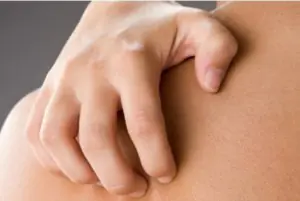
- its localization;
- the condition of the skin at the site of such sensations;
- conditions for the appearance and relief of itching;
- additional symptoms.
Let’s consider the combination of these factors to make it easier to get examined and choose exactly the specialist who can quickly alleviate your condition.
Types of itching
The prevalence of the symptom is the main criterion from which the diagnosis of the cause of skin itching begins. Based on this measure, pruritus (the so-called itching in medicine) may be:
- Localized (a person can indicate a specific place where itching is felt).
- Generalized (throughout the whole body, not necessarily at the same time).
Generalized itching
- Diseases of the liver and biliary tract: hepatitis, cirrhosis, pancreatic cancer, cholestasis of pregnancy, giardiasis.
- Kidney failure.
- Presence of worms in the intestines.
- Thyroid diseases.
- Gout.
- Diabetes.
- Hypovitaminosis A.
- HIV infection.
- Oncological diseases: stomach cancer, multiple myeloma, erythremia, iron deficiency anemia, leukemia, lymphogranulomatosis, non-Hodgkin's lymphoma.
- Mental illnesses: depression, phobias, mnemoderma (itching associated with the mention of biting and stinging parasites).
- Senile itching.
- Itching when going up to altitude.
- Associated with neurological diseases: brain tumors, multiple sclerosis.
- Seasonal itching.
- For systemic pathologies, for example, periarteritis nodosa.
Localized itching
| Localization | Causes |
| On the face |
|
| On the head |
|
| In areas subject to friction | Bullous pemphigoid |
| On the crooks of your wrists | Atopic dermatitis, lichen planus |
| In the anal area |
|
| In the genital area |
|
| In areas covered by clothing most of the year | T cell lymphoma |
| On the back, on the hips | Folliculitis |
| On the knees | Atopic dermatitis |
| On hands | Scabies |
| Anywhere | Neurodermatitis, eczema, contact dermatitis, insect bites |
Itching accompanied by changes in the skin
This symptom indicates pathologies that are within the competence of dermatologists. That is, local changes are accompanied by skin diseases that are less dangerous than systemic diseases.
Diseases accompanied by redness of the skin
Itching and redness of the skin are more typical for inflammatory or allergic diseases. This:
- Contact dermatitis: irritation and itching located in the area that came into contact with the allergen. The boundaries of redness are clear. To diagnose, you need to remember what new places you have been to, what new household chemicals you started using, what clothes or accessory you put directly on your skin. So, redness in the armpits may be associated with wearing a new woolen sweater/dress or clothes that are familiar, but washed with a new powder. And itching of the skin of the hands - using a new cream or other chemical product. A characteristic feature of this disease is the complete disappearance of symptoms after the allergen ends.
- Atopic dermatitis is a disease that most often affects children, but atopic dermatitis can also occur in adults. Its causes are an allergen, most often taken orally with food. In children, redness is located mainly on the skin of the face (on the cheeks), the flexor surface of the knees and elbows. In adults: the face is excluded, wrists, knees and elbows may turn red - on their bends.
Combination of itching and rash
If such blisters protruding above the cover appear after mechanical friction of this area - dermographic urticaria
| Disease | Type of rash | Localization, features |
| Contact dermatitis | Redness with a clearly defined border; there may be blisters at the top of the redness | Anywhere. Can recall contact with clothing/accessory/chemical |
| Redness that has a border, protrudes above the skin level, and tends to merge with each other, similar to a mark left by a nettle. | Anywhere | |
| Bullous pemphigoid | Initially, redness rises above the skin, after which a bubble of tense properties appears in this place | In places where friction occurs with clothing or accessories (bag belt, watch belt) |
| Eczema | At first there is redness and swelling, which have a clear shape, then bubbles appear, some of which open, and crusts develop in their place. Elements of several stages are observed in one place (redness, blisters, crusts) | Symmetrical areas of skin, most often on the extremities (especially the upper ones), as well as the face |
| Limited neurodermatitis | Dry plaques, around which there may be red spots that do not have clear boundaries with healthy skin | On the sides of the neck, in the folds |
| Neurodermatitis diffuse | In adults - dried spots on the skin, surrounded by a reddish rim, without a sharp transition to healthy skin | Eyelids, feet, lips, hands. May be all over the body. |
| Swelling and redness, swelling and peeling, there may be red rashes, blisters or crusts on top | In children - after the introduction of complementary foods - on the cheeks, collar area, upper limbs | |
| Small spots of various shapes protruding above the skin, shiny | At the 2nd year of life, located in the area of the folds | |
| T cell lymphoma | Red rash on the skin, accompanied by itching, oval | In places not exposed to sunlight |
| Lichen planus | Violet, polygonal shaped polygonal polygonal granules with scales that rise above the healthy cover | Flexion surface of the wrists |
| Folliculitis | Bubbles and pustules | Hips, back, chest |
| Psoriasis | Silvery plaques with peeling on top | Extensor surface of the extremities, itching of the scalp and neck, palms and soles |
| Scabies | Paired black dots are visible | Arms, armpits, stomach, genitals |
Combination of itching and skin peeling
Itching accompanies peeling of the skin in the following cases:
- The outcome of an allergic reaction, which manifested itself as urticaria. The allergy could be caused by:
- products;
- medicines;
- animal saliva;
- household and other chemicals;
- insect bites;
- cosmetics.
If the itching is accompanied by a burning sensation
Burning and itching most often occur at the site of skin inflammation. This may be a reaction to mechanical irritation when shaving, using a depilator or waxing. Poorly healing inflammation in diabetes mellitus is also possible, which burns due to the pH of the tissues changing as a result of this metabolic disease. Burning and itching may be accompanied by diseases of the veins of the lower extremities - then the skin may be swollen, slightly bluish, but without any visible rash.
A combination of these two symptoms can develop in a person when a rash appears (see the corresponding section) - as an individual reaction to eczema, neurodermatitis, urticaria or other dermatitis.
Other symptoms that may indicate the cause of itching
The symptom may also indicate systemic diseases:
- With cholestasis, in addition to itching, yellowness also occurs, if not of the entire skin, then of the whites of the eyes. Itching more often appears in places that rub with clothing, intensifies at night;
- the smell of urine from the body, dry skin sprinkled with white “powder” and its itching, a change in the amount or color of urine indicates kidney failure;
- itching of the skin after taking a warm bath/shower is characteristic of erythremia, a pathology when the number of red blood cells is significantly higher than normal.
However, if the skin itches for some time after swimming (shower, bath) only during the heating season, it is possible that the skin reacts this way to “technical” hot water in the tap, containing various harmful impurities. If itching is felt after swimming and in the summer, perhaps the reason is that the water is very hard, with a high content of chlorine.
Itching without other symptoms
When itching appears, and there is no dryness, no “powder”, no spots, or any changes in color on the skin, it may be:
- disease of the hematopoietic system, in particular lymphogranulomatosis. You need to consult a therapist who will palpate a person’s lymph nodes, prescribe and interpret a hemogram and other blood tests, and refer you to a hematologist or oncologist;
- senile itch, which appears after 60 years of age for an unknown reason. But, even if you fit into this category, you need to rule out more serious diseases;
- mental or neurological diseases, the symptoms of which you may not notice;
- population of the intestines with helminths, which can be excluded by analyzing stool for their eggs, as well as blood tests for antibodies to worms. Prescribing such a diagnosis is the job of an infectious disease doctor (he can be found in the clinic in the office with the abbreviation “KIZ”).
In any case, you may not notice the symptoms that a qualified doctor will pay attention to, so if itching occurs, contact him.
Treatment
Treatment for itchy skin is prescribed after an examination, the purpose of which is to identify the cause of this condition. The main tests that will help clarify the ethology will be:
- general urine and blood tests;
- blood glucose;
- skin scraping to identify fungi;
- liver and kidney tests (blood);
- test for occult blood in stool;
- detection of helminth eggs in feces.
While the tests are being performed, to alleviate the symptoms of itching - if there are no signs of renal or liver failure, which the doctor must tell you about - antihistamines are prescribed: "Eden", "Fenistil", "Diazolin", which do not cause drowsiness, or more powerful drugs, but with this effect (“Suprastin”, “Tavegil”).
For a localized lesion, an antiallergic ointment for skin itching can be used, for example, Sinaflan, Akriderm, Apulein, hydrocortisone ointment or other corticosteroids. Sometimes other local drugs of non-hormonal origin are prescribed - “Prograf” or “Elidel”.
If itching is caused by cholestasis, bile acid-absorbing drugs have been used successfully. When the cause of the symptom lies in a blood disease, specific drugs are used - monoclonal antibody inhibitors. Psoriasis is treated by combining local and systemic medications that normalize skin cell division.
In case of extremely severe itching, weak opiates are prescribed, and treatment is supplemented with hirudotherapy, ultraviolet irradiation of the skin and acupuncture.
Thus, the causes of itching of the scalp and body are varied. Most often, these are various allergic reactions both to a substance that has entered the body and to a substance that has touched the skin. But there may also be life-threatening kidney diseases, liver diseases, or even blood diseases. To clarify the cause and select treatment, you need to undergo a comprehensive examination.
Itching is usually accompanied by an unpleasant burning sensation, tingling and redness of the skin. Very often, this symptom appears as a result of skin interaction with chemicals, poisonous insects, plants or other irritants. Also, itching on the body may appear due to allergens that enter the body through the oral cavity or injections. If such a disease is detected, you should immediately seek help from a dermatologist. Irritation and redness of the skin may indicate that a person has a serious illness.
In this article we will talk in detail about the causes and methods of treating itchy skin.
Main types of itching
Why does the body itch? This process occurs due to the fact that a person touches and begins to massage the affected area. After this, blood circulation processes in this area of the skin are enhanced, and toxins are removed from the lymph flow. The desire to scratch the skin temporarily disappears, but over time the itching appears again.
Doctors have divided body skin itching into two types:
- Localized. Severe burning occurs in certain areas of the skin (for example, in the perineum, anus, legs, arms, etc.).
- Generalized. An unpleasant symptom covers the entire body. In this case, there may be no redness of the skin.
Both types of itching can be either temporary or permanent. If a person experiences a strong burning sensation for a long time, this can trigger other symptoms (sleep disturbance, lack of appetite, uncontrollable scratching of the skin until blood appears).
Doctors have found that itching on the skin intensifies in the evening. This occurs due to the fact that the body temperature becomes higher and the blood vessels dilate. In turn, this leads to increased blood circulation.
Common causes of itchy body skin
Burning and tingling of the skin can occur due to various diseases or upon contact with irritants. It is very difficult to independently identify the cause of such an illness. So, let's look at what it could be.
Itching occurs due to various diseases:
- Biliary dyskinesia or liver disease. Due to disruption of these organs, bilirubin and cholic acids are deposited in the epidermis.
- Diabetes. Severe body itching occurs due to elevated blood glucose levels.
- Xerosis – increased dryness of the skin. The causes of the disease are the use of harmful cosmetic products or hormonal imbalance.
- Hives. In the presence of this disease, small itchy formations appear on the human body.
- Psoriasis. Localized type of itching. Most often it appears in the elbows, armpits and neck.
- Scabies is a contagious skin disease caused by the scabies mite. Itching of the skin of the body is observed due to the fact that an immunoallergic reaction of the human body to the waste products of the parasite occurs.
- Contact dermatitis. A distinctive feature of this disease is that a rash with clear boundaries appears on the skin, on top of which blisters can form.
- Atopic dermatitis. Most often, this inflammatory skin lesion develops in children. Signs of this reaction: peeling, redness and dryness of the cheeks, long lasting diaper rash in the folds of the skin (especially in the perineum and buttocks).
- Neurodermatitis. This disease occurs as a result of a malfunction of the human immune and nervous system.
In most cases, the body itches due to an allergic reaction. Any type of allergy has a negative effect on the skin. This happens due to the production of histamine in the body. This substance disrupts the integrity of the structure of the epidermis.
Also, in some cases, the body itches due to human contact with external irritants. Irritation may occur due to exposure to the following allergens:
- chemicals (including cosmetics);
- contact with poisonous plants;
- insect bites;
- some food products;
- side effect from taking medications.
It is extremely difficult to independently determine why your skin itches. Therefore, if redness, burning or tingling occurs, you should immediately seek help from a qualified specialist.
Diagnostics
Before starting therapy, it is necessary to identify the cause of the unpleasant symptom. To do this, you need to contact a dermatologist. This doctor examines and treats skin diseases. If you are sure that your skin may be itching due to an allergic reaction, then you should consult an allergist.
Diagnosis of patients is carried out according to the following plan:
- Examination of the skin.
- Collect information about the patient’s symptoms and well-being.
- Laboratory research.
In order to make a correct diagnosis, the doctor prescribes an individual examination for the patient. The patient must donate blood (for biochemical, general and detailed analysis), feces and urine. He will also need to undergo x-rays, endoscopy and ultrasound examinations. In some cases, the doctor may prescribe a tumor marker test for the patient.
These research methods help to identify disturbances in the functioning of organs, detect inflammatory processes, allergic reactions and allow one to assess the condition of the body.
Treatment methods
If burning, tingling and redness of the skin occurs, you should pay special attention to personal hygiene. If you have itchy skin all over your body, it is recommended to wipe the epidermis daily with a vinegar solution. If there is localized itching (in the anus or perineum), these areas should be thoroughly washed twice a day (morning and evening).
Drug treatment
Ointments are used to eliminate unpleasant symptoms. It is worth remembering that these medications are temporary and will not help get rid of skin irritation forever.
The most effective medications for external use:
- Sinaflan. The ointment is applied to the affected area no more than four times a day. With prolonged use of the product, pigmentation disorders, dryness, hair loss, etc. may appear on the skin. Before using the ointment, read the instructions.
- Levomekol. An effective ointment for itchy skin, has an anti-inflammatory effect. Contraindications: hypersensitivity, presence of trophic ulcers or severe burns. Side effects when using the drug are extremely rare.
- Fenistil gel. The product is applied to the affected areas several times a day. Sometimes the gel can cause dry skin. If more serious side effects occur, you should immediately stop using the product.
In most cases, skin irritation occurs due to elevated histamine levels. To eliminate the symptoms of itching, doctors recommend using antihistamines.
- Suprastin. The dosage of the drug is prescribed individually (depending on the age and weight of the patient). Side effects are rare and disappear quickly. The drug should not be used in children under three years of age, during pregnancy, lactation and with lactose intolerance.
- Erius. Common side effects when using tablets: dry mouth, weakness, headache, anaphylactic shock. The drug is contraindicated in nursing and pregnant women. It should also not be used for renal failure.
- Claritin. The drug acts on the cause of itching of the skin of the body. You can completely get rid of irritation in just one week. Dosage – no more than one tablet (10 mg) per day.
- Tavegil. Take the tablets before meals with water. Children from 6 to 12 years old are recommended to take 1/2 tablet per day. Dosage for adults and children over 12 years of age – 1 mg twice a day (morning and evening).
Ointments based on glucocorticosteroids:
- Triderm. This product has an anti-inflammatory effect and quickly eliminates redness and irritation of the skin. Treatment lasts no more than one month. Side effects when using the cream are rare. Steroid ointment has a number of contraindications; read the instructions before using it.
- Fluorocort. The medicinal ointment should not be used by pregnant and lactating women and small children. Also, this remedy is not recommended for use against fungus, syphilis and skin tuberculosis. The cream must be applied to the affected area 2-3 times a day. If your whole body itches after using the medicine, you should consult a doctor.
- Lorinden. With long-term use of steroid ointment, some side effects may appear: dryness and short-term redness of the skin, impaired pigmentation of the epidermis. The product is applied in a thin layer to the skin no more than three times a day. The course of treatment is 2 weeks.
It is strictly forbidden to use the above medications without a doctor’s recommendation. Self-medication can worsen your health and lead to various complications.
Traditional medicine
What to do if your body itches, but you don’t have the opportunity to visit a dermatologist? You can eliminate burning and redness using traditional medicine. It is worth remembering that home remedies only provide temporary relief from itching.
- First aid for inflammation is a cream with chamomile extract or glycerin. The cream must be applied 4 times a day.
- If the itching appears as a result of an insect bite, wipe the affected area of the body with alcohol.
- Soda lotion. Mix a teaspoon of baking soda with water. If desired, you can add chamomile tincture or baby cream to the paste. Apply the resulting product to the skin, and after a while, rinse it with water.
- Mix tea tree oil and menthol in equal proportions. This product will pleasantly cool the skin and eliminate redness and irritation. Treat itchy body skin until all symptoms completely disappear. Repeat the procedure several times a day.
- Add chamomile tincture, baking soda and salt to your bath. The duration of the procedure is 15 minutes.
- Pumpkin seeds. In order to alleviate unpleasant symptoms, it is recommended to eat 2-3 tablespoons of seeds in the morning (on an empty stomach). You can also add them to various dishes (sauces, salads, drinks).
- After showering, apply a small amount of olive oil to your body.
Preventive measures
In order to prevent the development of itching of the skin of the entire body, it is recommended to carry out the following preventive actions:
- Maintain personal hygiene, but don’t get too carried away. Washing your body and head too often leads to disruption of sebum secretion. It is advisable to shower no more than once a day. Also try to use natural detergents and hypoallergenic soaps.
- Install a humidifier at home. It will keep your skin healthy.
- Avoid stress and emotional turmoil. To calm down, drink herbal tea every evening.
- Try not to wear clothes made from synthetic fabrics, as they can cause irritation.
You also need to watch your diet. To prevent the development of itching throughout the body, it is necessary to exclude spicy, smoked, flour and fatty foods from the diet. Avoid foods that may cause allergies (alcohol, chocolate, oranges, grapefruits, nuts, etc.). Vegetables, lean meat, cereals and dairy products should form the basis of your diet.
Video on the topic
>



